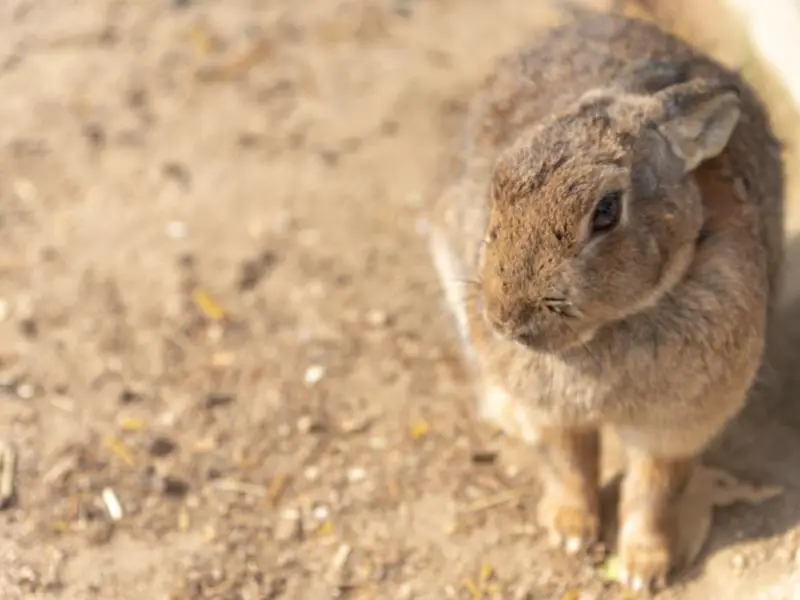Rabbit is still more of a popular menu item on European restaurant menus than on American menus, but can you eat wild rabbit if you like to go hunting? And is it safe to do so?
You can eat wild rabbits. But safely (and legally) eating wild rabbits depends on where you hunt the rabbit, whether it is legal and if you have a permit, when you eat the rabbit, how you skin the rabbit, how you prepare the meat, and how rare, medium-rare, or well done you eat it.
Ready to learn more about eating wild rabbits so you are prepared the next time you see a wild rabbit? This detailed guide has all the information you need.
Is Rabbit Safe to Eat?
Various factors affect whether a rabbit is safe to eat or not. Let’s look at those factors regarding eating wild rabbits and eating farm-raised rabbits.
Eating Wild Rabbits
Eating wild rabbits can be safe. However, the safety of wild rabbit meat depends on how healthy the rabbit is, how you field dress (or skin) the rabbit, and how you store, prepare and cook the meat.
There are various diseases and parasites wild rabbits may have that you can contract (more on this in a bit).
When field-dressing the wild rabbit you’ve caught or hunted, it’s advised to wear protective gear like gloves to prevent any disease-infected blood or meat from infecting you.
On hot days, the meat should be stored in a cooler box, and it’s recommended to cook the rabbit until it reaches an internal temperature of 160-165℉ so harmful bacteria will be killed.
Eating Farm-Raised Rabbits
Generally, farm-raised rabbits are safe to eat, but this depends on the sanitary conditions of:
- How the animal was raised
- How the animal was slaughtered
- How the meat was stored and prepared
You can choose to eat high-quality farm-raised rabbit meat rare, medium-rare, or well done, provided you are dining at a quality restaurant or buying your rabbit meat from a reputable supplier.
Does Wild Rabbit Taste Good?
If you like gamier meat, the wild rabbits will taste good. However, what the wild rabbit meat tastes like also depends on the type of rabbit you are eating.
In general, wild rabbit tastes gamey, earthier, leaner, and drier compared to farm-raised domestic rabbits. Imagine the taste of a gamey chicken – that’s what rabbit meat tastes like.
Similar to chicken, rabbit meat will take on the flavor of what you cook it in, whether you use spicy aromas, curry powders, or herbs.
Benefits of Eating Rabbit Meat

There are various benefits of eating rabbit meat, whether it’s from a wild or domestic, farm-raised rabbit:
Rabbit Meat Is Environmentally Friendly
The cost and requirements to raise rabbits are a lot less than it is to raise cattle, for example.
Rabbits don’t eat as much as cattle. And rabbits are slaughtered at 3 months of age, while cattle are slaughtered generally when they are 12-22 months old.
Rabbit Meat Is High in Digestive Protein
In general, rabbit meat has the highest percentage of digestive protein when compared to other types of meat.
Rabbit meat has a 1.3 times higher digestible protein content than beef, and the little animal’s meat contains more amino acids.
Rabbit Meat Is Low in Sodium
Rabbit meat is low in sodium. One serving of rabbit meat is 3 ounces, and it contains only 38.3 milligrams of sodium.
This makes rabbit meat ideal for those who need to limit their sodium intake or follow a DASH diet.
Rabbit Meat Is Low Calorie
Perfect for those who are looking to lose weight, rabbit meat isn’t high in calories or fat.
One serving of rabbit meat is only 147 calories, which is 1.5 times less than the calories found in beef.
Rabbit Meat Is Nutritious
Rabbit meat is also high in nutrients and vitamins like:
- Vitamin B3
- Vitamin B12
- Vitamin E
- Vitamin K
- Potassium
- Iron
- Magnesium
- Phosphorous
- Copper
- Calcium
Can You Get Diseases From Wild Rabbits?
There are various diseases you can get from exposure to or eating wild rabbits:
Tularemia (Rabbit Fever)
Tularemia, caused by bacteria, is passed on to a rabbit via a tick or deer fly bite. People are exposed to tularemia when they field dress the rabbit after a hunt; the bacteria live in the wild rabbit’s meat and blood.
However, rabbit fever is also transmittable via inhaling airborne bacteria.
An infected rabbit may be lethargic or uncoordinated, or you may not see any visible signs until you cut the rabbit open. Check the spleen and liver for signs of swelling and white/yellow spots, indicating tularemia.
If you feel unwell after exposure to tularemia, get medical attention right away; otherwise, it may be fatal.
Warbles
A rabbit with lumps all over its skin has warbles. The larvae of bot flies (aka warbles) like to hatch under the rabbit’s skin.
Simply remove these abscesses with a sharp knife when hunting wild rabbits as the meat is edible, whether you remove the warbles or not. But ensure to cook the meat well to ensure the larvae are killed.
Intestinal Parasites or Worms
Typical intestinal worm infections that can be passed onto people from wild rabbits are protozoa, roundworms, and tapeworms.
You will only be infected if you eat the wild rabbit’s infected intestines. These are usually discarded, so it’s rare for people to be infected with intestinal parasites via a rabbit.
External Parasites and Ringworm
Lice, ticks, fleas, and ringworms are passed via wild rabbits to hunters during hunting season or during the summer when these parasites are active.
Rabies
It’s rare for a person to contract rabies, a viral disease that’s deadly, from a wild rabbit, but it is possible. However, there are no confirmed cases.
But if you do come across a rabies-infected rabbit, beware as they can spread rabies to you via a bite or scratch.
My Last Bunny Thoughts
A person can eat rabbits, whether they are wild or domesticated. And eating rabbit meat can be safe.
Generally, farm-raised rabbit meat is safer to eat than wild rabbit meat. But when you hunt wild rabbits, make sure you follow all the safety protocols so you stay safe and protected – from field dressing or skinning the rabbit to preparing, cooking, and eating the meat.


